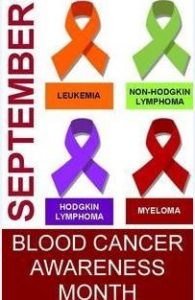September is Blood Cancer Awareness Month. What is a blood cancer you may ask? A blood cancer is a cancer that affects your blood cells including how they are produced by the body and how they function. In these cancers, the development of blood cells is interrupted by the growth of abnormal types of blood cells. Because of this uncontrolled growth, the blood can’t perform its normal functions like fighting infection and prevention of bleeding. (American Society of Hematology, http://www.hematology.org/Patients/Cancers/) There are several types of blood cancers including leukemia, lymphoma and myeloma.

According to the Leukemia and Lymphoma Society, every 3 minutes someone in the United States is diagnosed with a blood cancer and more than a third of blood cancer patients do not survive five years after their diagnosis. During my time as a floor nurse, I had the privilege of taking care of many patients fighting blood cancers. The treatments they endure are arduous and lead to many challenging side effects such as peripheral neuropathy, nausea, pain, and mucositis. Their strength was always inspiring.
Blood cancers are very challenging and costly to treat due to the fact that these diseases are very complicated in nature as are the treatment plans. During the month of September in honor of Blood Cancer Awareness Month the Leukemia and Lymphoma Society has the goal of raising $300,000 to be used for research, education and access to affordable treatment. As of Friday, September 2, they are already at 10% of their goal. Besides donating money directly to the organization they have a number of fundraising campaigns including Team in Training, Light the Night and the Student Series.
What else can you do besides donate money during the month of September?
- Become an advocate. You can do this by reaching out to members of Congress about Medicare Part D and working to reduce the cost of co-pays for seniors whose medications are within the “specialty tier”. You can also ask your local representative to help patients afford their costly treatments through the Patient’s Access to Treatments Act. Lastly, you can write to Congress to increase federal funding for cancer research.
- Volunteer! Volunteer to help with a fundraising campaign, office support, education programs, patient services, and family support groups. The opportunities are endless!
Show your support for Blood Cancer Awareness not only during the month of September but every month. Do what you can to show these patients that we support them every step of the way of their cancer journey!
It’s quite interesting that I came across this today. My girlfriend was diagnosed with non-hodgkins lymphoma about a month ago, it’s a long and winding story but ahe fell from a bus and hit a rail which apparently caused internal bleeding that was not treated properly or addressed by the original doctor; the battered blood that remained from the accident travelled to all sorts of places in her body, messed up her marrow and caused the creation of abnormal blood cells which are now all over her body. It took a mosdiagnosis of asthma due to a breathing problem before we referred to a lung specialist who foind it was clotted blood that was blocking het left lung, ran more blood work and confirmed the lymphoma. She did tests last week anf was informed she is now a stage III of IV and she should be back this week to see how fast the cancer is progressing. We don’t live in a country where healthcare is readily available or even highly trusted so I’m on here now to try and see what I can find that might help. The survival rate you shared caused me to zone out but I wanna start as early as possible to see how I can help not just my girlfriend but other persons with blood cancer.